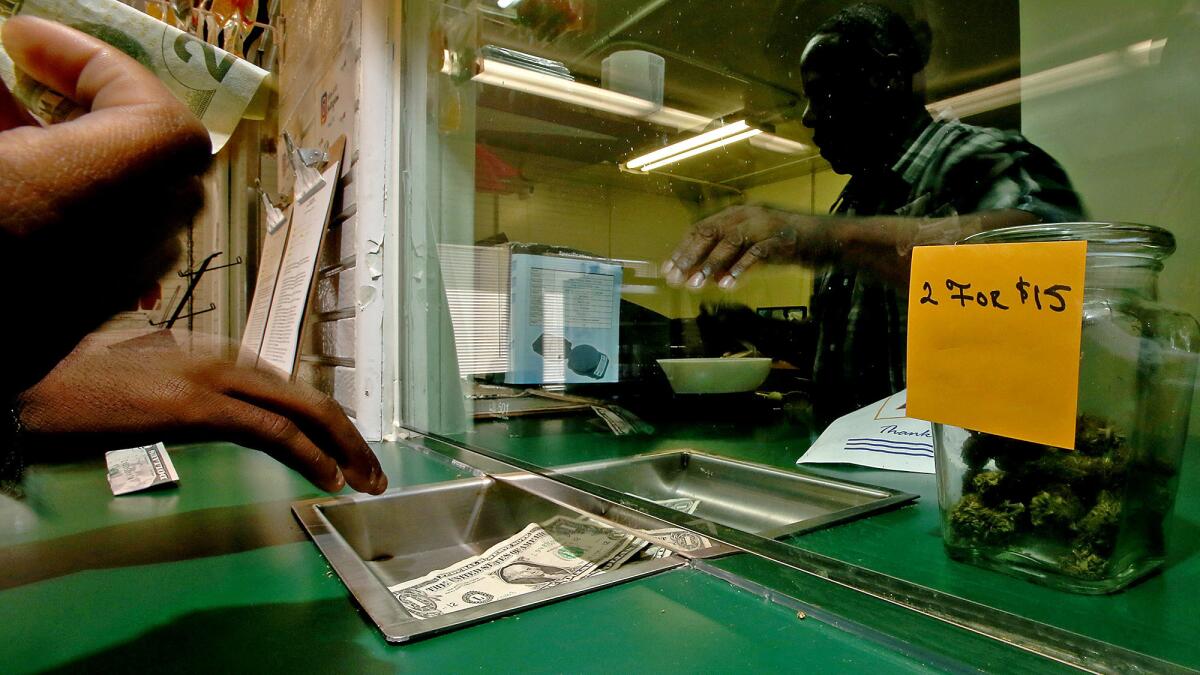Should California start its own bank to serve marijuana companies? It wouldn’t be easy

- Share via
With recreational
Over the last year, there has been increasing interest among cannabis businesses and public officials in the idea of public banks: government-owned institutions that would take deposits, make loans and, in California at least, be willing to work with marijuana companies.
Gubernatorial candidate and California Lt. Gov.
But would it work?
Maybe, said Matt Stannard, who has been an advocate of public banking long before California residents voted to legalize recreational pot use last year.
He’s optimistic, but also warns that there are plenty of potential pitfalls.
“I’m not going to say that if you create a public bank, it's going to solve all of the marijuana industry's banking problems,” he said. “But it’s worth a try.”
Why a public bank?
A public bank is much like a private one, taking deposits and making loans. There are a few big differences:
Public
- Owned by the public.
- Run by elected or government-appointed officials.
- Run to support public priorities and return profit to the public.
Stannard, policy director for Sonoma, Calif.-based advocacy group Commonomics USA, said there are a handful of potential benefits of public banks, some economic and some social, irrespective of their use by the marijuana industry.
If California had a public bank, the state could deposit tax revenue there rather than at a private bank. Those deposits would then be used to make loans.
But unlike at a private bank, those loans could be used to support state needs — such as affordable housing — and profits could be returned to the state coffers.
The Bank of North Dakota, the only publicly owned bank in the country, has paid $85 million into various state government funds over the last four years, according to its most recent annual report. It makes low-interest student loans and farm loans and helps finance local public-works projects, all priorities set by state leaders.
Newsom, in a series of tweets in May during the California Democratic Party convention, said California should develop a state bank to offer student loans and finance the construction of healthcare facilities and housing.
The cannabis candidate: Gavin Newsom dominates donations from the growing industry »
Stannard said the state could also make cannabis banking a priority, if for no other reason than to address the public safety concerns presented by the industry’s current reliance on cash.
“The voters of California have voted to allow recreational marijuana but, given the status quo, that’s a huge mess, and it’s dangerous,” he said. “A public bank may be the best way to clean up that mess and the best way to provide financial and physical security to the industry.”
But what about federal drug laws?
Most banks won’t knowingly work with marijuana companies because marijuana is an illegal substance under federal law. Banks are overseen and insured by federal agencies, so federal rules, not state ones, are key.
State- or city-owned banks could get around at least some of that federal oversight. At the Bank of North Dakota, deposits are insured by the state itself, not by the Federal Deposit Insurance Corp., taking one federal agency out of the mix.
The bank is overseen by the North Dakota Department of Financial Institutions, not by federal bank examiners. Ratings agency Standard and Poor’s noted in a 2014 report that Bank of North Dakota “has no oversight from U.S. government authorities or banking regulatory bodies.”

But there’s still at least one way federal rules could block public banks from working with pot businesses: by shutting them out of the
To be able to process checks, wire transfers and electronic payments — in other words, to interact with the rest of the financial system — banks must have an account with one of the nation’s 12 regional Federal Reserve banks. Without such an account, a bank is “nothing but a huge cash vault,” said Mark Mason, one of the founders of Fourth Corner Credit Union, a Colorado institution that aimed to serve that state’s cannabis industry.
When Fourth Corner applied for an account at the Federal Reserve Bank of Kansas City in 2014, the application was denied, in part because of its plans to focus on the marijuana businesses. The credit union sued, arguing it was entitled to an account, but a federal district judge sided with the Kansas City Fed.
The credit union appealed and it now appears Fourth Corner will be able to get an account — but only if it pledges not to work with cannabis businesses. Mason said the credit union’s plan for now is to serve marijuana advocacy groups and perhaps businesses that are connected to the industry but that don't grow or sell cannabis.
There has been no firm ruling on the key issue in the case: whether a financial institution that plans to work with cannabis companies will be able to get a Fed account. Stannard said public officials and cannabis entrepreneurs pushing for public banks should be aware of this, though it shouldn’t stop them from proceeding.
“It is not a settled question,” he said. “There are legal barriers still. But our position is it’s a battle worth fighting.”
He also suggested that the Federal Reserve Bank of San Francisco, the central bank for California and eight other western states, may take a different approach than its counterpart in Kansas City. What’s more, he suggested California’s size could allow it to succeed where Fourth Corner failed.
“There’s a big difference between an application from a tiny credit union and an application from the sixth-largest economy in the world,” he said.
How long are the odds?
If California, Los Angeles, Oakland or any other jurisdiction in the state successfully creates a public bank, it would be the first to do so in the United States in nearly a century.
A handful of states had their own public banks in the 1800s, but now the Bank of North Dakota is the only one remaining — and its origins have a parallel in the current public-bank movement.
The Midwestern bank was created in 1919 at the behest of wheat farmers who felt they were being overcharged by banks in Chicago and Minneapolis. Today, the cannabis industry feels mistreated and is pushing for a public option.
“This industry has been shut out of traditional banking systems in California, creating a catalyst for us to take up the public-banking question,” said gubernatorial candidate and state Treasurer John Chiang, who has said he is interested in public banks but has not endorsed the idea.
He leads a group of regulators and cannabis industry representatives trying to bring the industry into the mainstream. Public banking will be the focus of the group’s next meeting, to be held in Los Angeles next month.
There’s also the notion that a public bank could provide loans that private banks are less interested in making.
“Imagine … a bank where its vision statement is to finance the building of affordable housing,” Wesson said in a speech Tuesday. “Imagine if we had a bank that is focused on working with small business entrepreneurs to give them loans.”
There have been campaigns for public banks for years in other states and cities, especially in the wake of the financial crisis, but they haven’t gone anywhere. A 2012 California Assembly bill calling for the creation of something approaching a state bank never made it to a vote.
In Massachusetts, the state Legislature in 2010 called for a study on the feasibility of creating a state bank. The resulting report recommended against such an institution, finding that the state would have to borrow billions of dollars to set up the bank and that depositing public funds in such a bank could put taxpayers at risk.
That, Stannard said, is how most public banking campaigns die.
“It’s always a question of political will,” he said. “You have public officials who are risk averse, and the safest thing to do is nothing.”
Even if the idea moves forward, creating a public bank could take years.
Dan Newman, a spokesman for Newsom’s campaign, said the lieutenant governor is open to the idea of a public bank that would work with cannabis companies, but said such an institution is not “a short-term answer or an immediately scalable option.”
And, of course, there’s the banking lobby. Private banks and their trade groups would probably fight the creation of a public bank, on the grounds that a public institution could have an unfair competitive advantage, said Simone Lagomarsino, chief executive of the California Bankers Assn.
“Who’s going to regulate the bank? Who’s going to examine it? If it loses money, are taxpayers OK with absorbing a loss? These are questions our bankers would be asking,” she said.
Follow me: @jrkoren
Inside the business of entertainment
The Wide Shot brings you news, analysis and insights on everything from streaming wars to production — and what it all means for the future.
You may occasionally receive promotional content from the Los Angeles Times.








